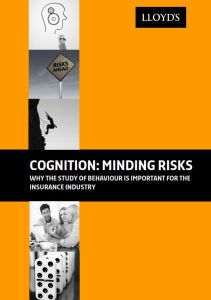Rejoignez getAbstract pour lire le résumé !

Rejoignez getAbstract pour lire le résumé !
Mario Weick, Tim Hopthrow, Dominic Abrams and Peter Taylor-Gooby
Cognition: Minding Risks
Why the Study of Behaviour Is Important for the Insurance Industry
Lloyd’s, 2013
Aperçu
Did you see the 2008 fiscal crisis coming? How about the next one? Shift your perspective to spot emerging risks.
Recommendation
Lloyd’s sponsored this report on risk identification for the insurance industry, but don’t let that fool you. This is a focused, methodical overview that a wide range of readers will find useful. It explains the current understanding about human behavior in assessing risk. It addresses the impediments to clear thinking and identifying risk accurately that arise from organizational structures, human nature and society. getAbstract suggests this enlightening study to insurance and finance professionals, investors, innovators and anyone charged with “minding risks.”
Summary
About the Authors
University of Kent professors Mario Weick and Tim Hopthrow teach psychology, Dominic Abrams teaches social psychology and Peter Taylor-Gooby, OBE, teaches social policy.


















Comment on this summary